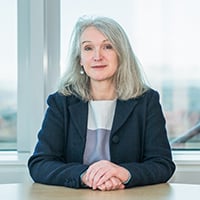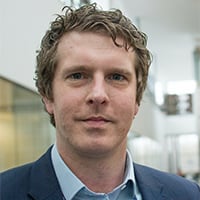Demis Hassabis CBE, co-founder of AI research company Google DeepMind; computer scientist Professor Jane Hillston MBE; and leading digital policy expert, Professor Tom Crick MBE, will all receive the BCS Lovelace Medal this year.
The Lovelace Medal is presented annually by BCS, The Chartered Institute for IT for outstanding contributions to the advancement of computing. Previous winners include worldwide web inventor Sir Tim Berners-Lee and information retrieval pioneer Karen Spärck Jones.
This year, Demis Hassabis and Professor Hillston each have been announced as winners of the Lovelace Research Medal while the Lovelace Education Medal has been awarded to Professor Crick. The three will be awarded their Medals in December this year.
Innovators who have changed society
Rashik Parmar MBE, Group Chief Executive of BCS, The Chartered Institute for IT, said: “All three have advanced the global reputation of computing as a force for good, working across areas like AI, mathematical modelling with applications in science, and in teaching the next generation of computing leaders. All are innovators who have changed society for the better and helped increase our understanding of how the world works through information technology. We are incredibly proud to be able to honour them at a time when computing is being woven into every aspect of scientific research, industry and teaching.”
Demis Hassabis is co-founder and CEO of Google DeepMind, one of the world’s leading AI research groups. He receives the Lovelace Medal for his extraordinary contribution to artificial intelligence and to the UK technology industry. One of the world’s top computer scientists and a leading proponent of deep reinforcement learning, Demis attended the AI Safety Summit hosted at Bletchley Park this autumn.
Demis Hassabis said: "I’m honoured to receive the 2023 Lovelace Research Medal from BCS, The Chartered Institute for IT. I've spent my entire career working on artificial intelligence because I believe that it will be one of the most impactful and beneficial technologies for humanity ever, helping experts solve some of the world’s greatest challenges from curing diseases to tackling climate change.”
Jane Hillston is Professor of Quantitative Modelling and former Head of the School of Informatics, University of Edinburgh. She is awarded the Lovelace Medal in recognition of her work developing new approaches to modelling both artificial and natural systems by combining elements of formal languages with mathematical modelling. In addition to computer systems, the resulting formalisms have found applications in biological, ecological and social systems.
Jane Hillston said: “I am deeply honoured to be awarded the BCS Lovelace Medal and to see the value of my work in computing recognised in this way. I’m also grateful that my area of specialism is being recognised for its contribution across a range of scientific fields. Over the years I have been privileged to work with many collaborators, in the UK and internationally, and I'd like to thank them all for their support and contributions.”
Tom Crick is Professor of Digital Education & Policy and Deputy Pro-Vice-Chancellor at Swansea University, based between the School of Social Sciences and the £32m Computational Foundry. He receives the Lovelace Medal for Education for his contributions to computer science education across research, policy and practice. He is recognised internationally for leading the major STEM education and skills reforms in Wales over a sustained period, alongside wider leadership in UK digital, engineering and technology policy to support a thriving digital and data-driven economy.
For you
Be part of something bigger, join BCS, The Chartered Institute for IT.
Professor Tom Crick said: “It has never been more important to critically assess the potential impact of computing and digital technologies across all areas of policy, from national infrastructure and the economy, health and wellbeing, to heritage and culture – with education and skills being the foundation. That’s why I’m delighted and honoured to accept the BCS Lovelace Medal for Education. Now more than ever, we need to think about what it means to be a citizen in a digital, data-driven, computational and AI-enabled world. I’m hugely grateful to a diverse collection of colleagues, collaborators and mentors for helping make this wider work possible.”
About The Lovelace Medal
The BCS Lovelace Medal was established in 1998 in honour of Lady Augusta Ada Byron, Countess of Lovelace and daughter of Lord Byron. Born in 1815, Ada Lovelace was an English mathematician and writer, chiefly known for her work on Charles Babbage's proposed mechanical general-purpose computer, the Analytical Engine.
The Lovelace Medal recognises people whose work in the areas of research and education have contributed to significant advances in computing. Winners are chosen by an annual panel selected by BCS.
Academy of Computing Board. The panel considers factors such as the originality, impact, and ethical implications in their work.
More about Demis Hassabis
 Demis Hassabis is the co-founder and CEO of Google DeepMind, one of the world’s leading AI research groups. Founded in 2010, DeepMind has been at the forefront of the field ever since, producing landmark research breakthroughs such as AlphaGo, the first program to beat the world champion at the complex game of Go, and AlphaFold, which was heralded as a solution to the 50-year grand challenge of protein folding.
Demis Hassabis is the co-founder and CEO of Google DeepMind, one of the world’s leading AI research groups. Founded in 2010, DeepMind has been at the forefront of the field ever since, producing landmark research breakthroughs such as AlphaGo, the first program to beat the world champion at the complex game of Go, and AlphaFold, which was heralded as a solution to the 50-year grand challenge of protein folding.
A chess and programming child prodigy, Demis reached master standard aged 13 and coded the classic AI simulation game Theme Park aged 17. After graduating from Cambridge University in computer science with a double first, he founded pioneering videogames company Elixir Studios, and completed a PhD in cognitive neuroscience at UCL investigating memory and imagination processes.
His work has been cited over 100,000 times and has featured in Science’s top 10 Breakthroughs of the Year on 4 separate occasions. He is a Fellow of the Royal Society, and the Royal Academy of Engineering. In 2017 he featured in the Time 100 list of most influential people, and in 2018 he was awarded a CBE.
More about Jane Hillston
 Jane Hillston is known for developing new approaches to modelling both artificial and natural systems. In her doctoral dissertation she elegantly combined elements of formal languages from computer science with mathematical modelling deployed for performance evaluation, opening up a new approach to capturing and reasoning about the dynamic behaviour of systems. This led to the PEPA system, incorporating both temporal and probabilistic aspects in a process algebra framework. Subsequent work by Hillston and her group tackled a broad spectrum of applications including biological, ecological and social systems. More recently she pioneered fluid approximations in formal modelling systems and model checking.
Jane Hillston is known for developing new approaches to modelling both artificial and natural systems. In her doctoral dissertation she elegantly combined elements of formal languages from computer science with mathematical modelling deployed for performance evaluation, opening up a new approach to capturing and reasoning about the dynamic behaviour of systems. This led to the PEPA system, incorporating both temporal and probabilistic aspects in a process algebra framework. Subsequent work by Hillston and her group tackled a broad spectrum of applications including biological, ecological and social systems. More recently she pioneered fluid approximations in formal modelling systems and model checking.
She is the first person to receive three top accolades from BCS – the Distinguished Dissertation, the Needham Award, and now The Lovelace Medal.
More about Professor Tom Crick
 Professor Tom Crick MBE’s significant contributions to computer science education sit at the research/policy/practice interface. He is recognised internationally for leading the major STEM education/skills reforms in Wales over a sustained period alongside wider leadership in UK digital/engineering/technology policy to support a thriving digital/data-driven economy. His broader research interests also include levers for government innovation, digital public services, new economic models for the digital economy, digital democracy, and citizen/civic/public engagement. He also has extensive independent expert advisory, non-executive governance and assurance experience, across the public and private sectors, including Welsh and UK Government roles.
Professor Tom Crick MBE’s significant contributions to computer science education sit at the research/policy/practice interface. He is recognised internationally for leading the major STEM education/skills reforms in Wales over a sustained period alongside wider leadership in UK digital/engineering/technology policy to support a thriving digital/data-driven economy. His broader research interests also include levers for government innovation, digital public services, new economic models for the digital economy, digital democracy, and citizen/civic/public engagement. He also has extensive independent expert advisory, non-executive governance and assurance experience, across the public and private sectors, including Welsh and UK Government roles.

















